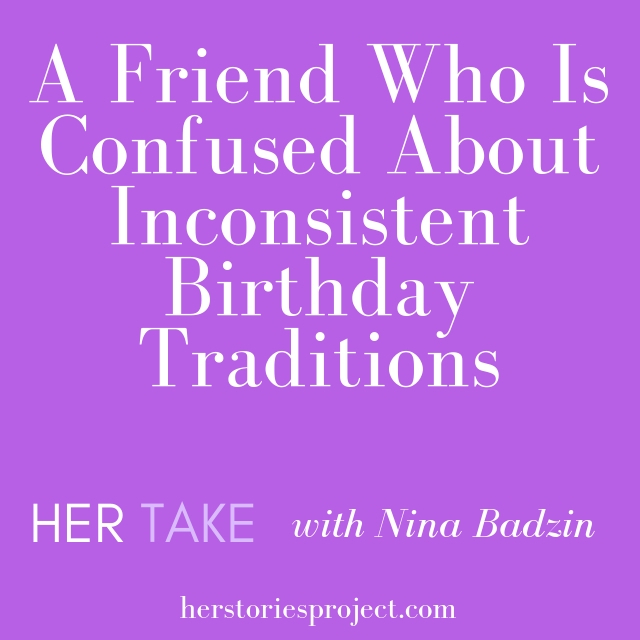What To Do When Friends Have Inconsistent Birthday Traditions
This month Nina addresses inconsistencies in birthday “traditions” between friends. Do you give gifts if you’re also taking friends out for a meal? What if some friends in a group get taken out for a meal and others don’t? And in the case of this month’s letter writer, what if the group does gifts for some friends, but not others?
Nina is always taking anonymous questions here. And catch up on all the other letters Nina has answered here.
Dear Nina,
My birthday was in July and a small group of my friends took me out to dinner. It’s the first time they have ever done this. I missed someone’s birthday from the group in August and then in September. I took those two women out separately, since I couldn’t make it to the group dinner.
However, the next birthday was in October, so I showed up at the restaurant and everyone else had a gift. I was so embarrassed because I was empty handed. I didn’t get the memo that gifts were now included in these outings. Isn’t taking the birthday girl out for dinner enough? Apparently at the one birthday dinner in August, gifts were given, but at the September dinner—no gifts. Why one and not the other?
Recently there were two more birthdays. I refused to show up empty-handed, so I got both women some cute, fun jewelry—nothing too expensive, around $20 each.
But why must we give gifts? How do we stop the gift giving without hurting others’ feelings? I didn’t get gifts at my birthday dinner, so I never thought to buy a gift for anyone else. I told my friend who sort of arranges these dinners that after our friend’s birthday in Dec, we should say no more gifts unless it’s a big birthday ending in zero or five. Not all the women in this group are super close, so it’s all awkward. I don’t know what the right thing to do is. Any advice you can lend would be appreciated.
Thanks,
Let’s Knock It Off With All These Gifts
Dear Let’s Knock It Off With All These Gifts,
You’ve come to the right person. Some may find this particular issue ridiculous to consider a friendship “dilemma” since it means you’ve mastered a question often asked here: How to make and keep a solid group of friends in the first place or at least a few friends close enough for birthday celebrations.
Friends who take you out! Friends who give gifts! What’s to complain about?
Let’s call this advanced friendship advice then. These etiquette conundrums and inner drives for practical living fascinate me endlessly. How can any sane and functioning crew of friends give gifts off the zero and five years with such randomness? You are absolutely right that this madness must end.
Not everyone will agree with me on this, but I think a meal can be gift enough in the off years. Now, if the birthday girl is throwing her own party and you’re attending as her guest, then a gift is proper. If she says no gifts, however, I try to respect that except in cases when I truly can’t help myself.
I asked my mom what people in her social life do for birthdays, and she said it’s a gift or a meal, not both, even for the big birthdays. Of course each person gets to make her own decision and just because a group of friends has decided not to do gifts, that doesn’t mean closer friends within the group or those for whom gift gifting is their go-to way of expressing closeness cannot privately hand over a present. Maybe those friends can consider not bringing the present to dinner in front of everyone else.
As for expressing closeness to friends, we each have our methods, whether we’re aware of them or not. Your letter made me think about how my friends know that I love them. I’m not the best about bringing a gift in the non-zero years or even initiating the birthday outings, but I make old-fashioned phone calls and leave all kinds of voice memos, too. I also answer calls, ask for advice, and give advice when asked. I also introduce my friends to everyone I know both to help them professionally and socially. So yes, my gift giving could stand to improve, yet I’ve managed to keep most of my friends.
My point is, I’m with you that gifts, while nice, are not the only way to “give” to a friend. And I agree that it’s immensely awkward the way your group of friends is giving gifts for some of the birthdays and not others with no discernible pattern. I like your idea of getting the woman who arranges these outings to announce before the January get together that it’s a new year and from now on, people should only bring gifts to dinner for the zero and five years. If she won’t bring up the topic, then you will have to decide if you’re up for doing it yourself. I noted you said this is the first year they’ve taken you out for your birthday. I’m not sure how long this group has been getting together and whether you feel it’s the right time to step in that way. Only you know!
Or, and this is advice I probably couldn’t take myself, you can also get comfortable with doing things your way (no gift) even when others bring gifts for a friend’s 43rd birthday dinner.
Good luck! Let us know what happens in 2019!
Nina






